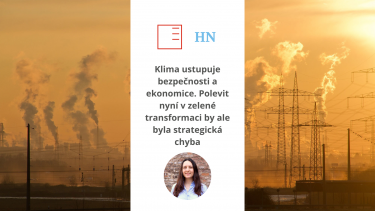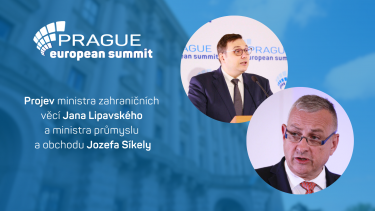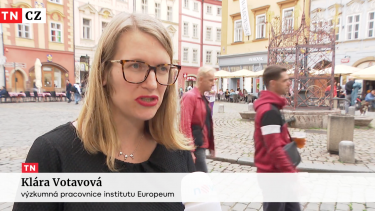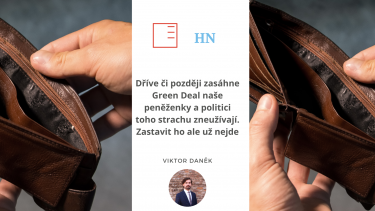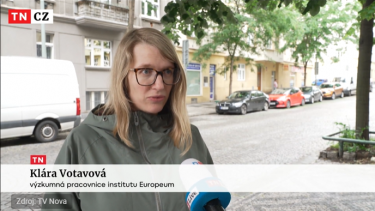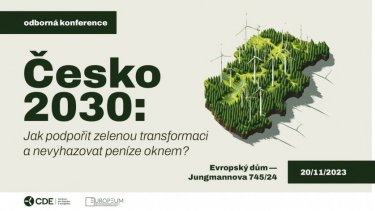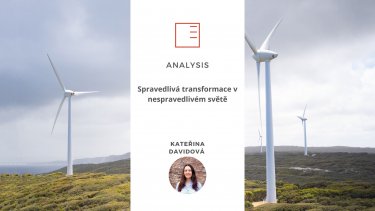Hospodářské noviny | Climate is giving way to security and economy. However, easing off on green transformation now would be a strategic mistake
This year's elections to the European Parliament have sparked debates about continuing the European plan to reduce greenhouse gas emissions to net zero by 2050, despite recent events suggesting the need to reassess this plan. The election results did not signify as much of a setback for European green ambitions as anticipated. The priority of climate and environment is no longer as high among most Europeans as it was five years ago, reflecting current political and international challenges such as security, economic prosperity, and the competitiveness of European industry. Kateřina Davidova, a researcher at EUROPEUM Institute, wrote an opinion piece on this topic for Hospodářské noviny.
Zjistit více
Prague European Summit | "Nuclear energy must be part of the Green Deal." Ministers Lipavský and Síkela presented their priorities for the next European Commis
Minister of Foreign Affairs Jan Lipavský and Minister of Industry and Trade Jozef Síkela delivered speeches at the 10th anniversary of the Prague European Summit. Both responded to the ever-changing challenges facing Europe and Russia's expanding aggression, while Minister Síkela stressed the need of economical transformation.
Zjistit víceTV Nova | How does the EU protect consumers?
The elections to the European Parliament start in the Czech Republic on Friday 7 June. Consumer protection has been one of the issues that have occupied MEPs for the past five years. But the original priority has had to give way to a number of current crises. Klára Votavová, a researcher at EUROPEUM Institute, commented for the main evening broadcast on TV Nova.
Zjistit víceHospodářské noviny | Sooner or later the Green Deal will hit our wallets and politicians are exploiting that fear. But it can't be stopped anymore
The Green Deal is becoming one of the main topics of the upcoming European Parliament elections. Candidate parties emphasize its importance and influence on future politics, with the expected changes affecting various sectors of the economy and the daily lives of citizens. In particular, the amendments to the rules for the ban on the sale of cars with internal combustion engines from 2035 and the upcoming ESG reporting, which could mean a significant administrative burden for medium-sized companies, are being discussed. The transformation towards green technologies brings both opportunities and challenges, and the outcome will depend on the skills and strength of individual negotiators in the coming negotiations. Viktor Daněk, deputy director of EUROPEUM Institute, discussed the topic in the Hospodářské noviny podcast.
Zjistit víceTN.cz | Possible changes in European subsidies
The European Parliament elections are less than two weeks away, and one of the main topics will be the subsidy system. A number of experts are calling for it to be changed, and questions arise as to where the European Union will get the money for subsidies. The transformation of the EU towards green technologies could limit financial resources for structural funds, which would have a negative effect mainly on poorer countries, including the Czech Republic. Economists also point to possible financial problems for the EU after the departure of Great Britain, one of the biggest contributors. Klára Votavová, a researcher at the EUROPEUM Institute, commented on the situation for TV Nova.
Zjistit víceCzech Republic 2030: How to support green transformation and not throw money out the window?
On 20 November 2023, the Centre for Transport and Energy, in cooperation with EUROPEUM Institute for European Policy, organised a conference entitled Czech Republic 2030: how to support green transformation and not throw money out the window? The conference was opened with an introduction by Josef Schwarz from the Representation of the European Commission in the Czech Republic.
Zjistit víceINVITATION | Czechia 2030: how to support green transformation and not throw money out the window?
We invite you to a conference on energy transition, meaningful investment and social security in Czech society, which will take place on Monday 20 November 2023 at 13:00 at the European House in Prague.
Zjistit víceAnalysis: Just transformation in an unjust world
In order for the green transformation to be successful, its social impact must also be addressed. But how do you achieve both carbon neutrality and social reconciliation in an unequal system? Our senior researcher Kateřina Davidová answers this question in her analysis for the journal International Politics.
Zjistit více
RevivEU
RevivEU project, carried out by four leading institutions in the V4 countries, looks at the needs, concerns and fears of the V4 citizens in four various EU-related topics. It does so through both quantitative and qualitative research of citizens´ attitudes towards climate change, migration, covid-19 and the rule of law. It also analyses the governmental policies in these four main areas and how the communication of these policies is framed in the public discourse.
Zjistit vícePrague Climate Academy
In 2023, the Green Europe team of EUROPEUM Institute for European Policy introduced a series of workshops aimed at communicating the topic of green transformation to the Czech public. The aim is to support journalists and civil society in developing public discourse on climate change and climate policies. Last year, the Prague Climate Academy focused on sustainability in transport. The topic of the first workshop was the decarbonisation of car transport in the context of electromobility. The second workshop focused on transport sustainability in the city of Prague. In 2024, we are following up with the topic of city adaptation to climate change. We will offer a series of discussions and workshops with experts on public space adaptation, blue-green measures, and public participation.
Zjistit více

Staroměstské náměstí 4/1
Praha 1 - Staré Město
110 00
tel.: +420 212 246 552
email: europeum@europeum.org
https://www.europeum.org
